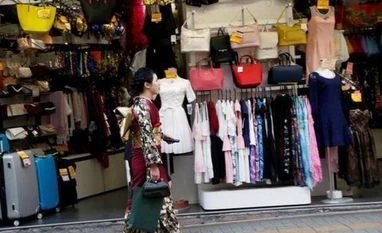Japanese retail sales were effectively flat in February as consumers cut back on food and durable goods after employers offered the lowest spring wage increases in four years.
Retail sales rose 0.1 per cent in February from a year ago, well below the median estimate for a 0.5 per cent annual increase, and much less than year-on-year growth of 1.0 per cent in January.
The anemic figures raise further doubt about the strength of private consumption, emphasising how difficult it will be for Japan's economy to generate sustained wage growth and price inflation, as envisaged in the government's "Abenomics" policies.
"I was expecting consumption to pick up in January-March, but so far things look weak," said Hidenobu Tokuda, senior economist at Mizuho Research Institute.
"This reflects concerns that wages this year won't rise as fast as last year. Some people are also feeling the pinch from higher energy prices."
The data showed that spending on foodstuffs fell an annual 1.5 per cent in February, the first decline in five months.
Spending on durable goods fell an annual 2.2 per cent in February versus a 0.8 per cent annual decline in the previous month.
Spending on general daily goods fell 5.1 per cent from a year ago, considerably faster than January's a 2.9 per cent annual decline.
Most major Japanese companies offered their lowest increase in base pay in four years at annual spring wage negotiations this year in a setback to consumer spending and overall economic activity.
In addition, a rise in crude oil prices last year and a falling currency have pushed up prices of gasoline, which is also starting to hurt consumer sentiment.
You’ve hit your limit of {{free_limit}} free articles this month.
Subscribe now for unlimited access.
Already subscribed? Log in
Subscribe to read the full story →

Smart Quarterly
₹900
3 Months
₹300/Month
Smart Essential
₹2,700
1 Year
₹225/Month
Super Saver
₹3,900
2 Years
₹162/Month
Renews automatically, cancel anytime
Here’s what’s included in our digital subscription plans
Access to Exclusive Premium Stories Online
Over 30 behind the paywall stories daily, handpicked by our editors for subscribers


Complimentary Access to The New York Times
News, Games, Cooking, Audio, Wirecutter & The Athletic
Business Standard Epaper
Digital replica of our daily newspaper — with options to read, save, and share


Curated Newsletters
Insights on markets, finance, politics, tech, and more delivered to your inbox
Market Analysis & Investment Insights
In-depth market analysis & insights with access to The Smart Investor


Archives
Repository of articles and publications dating back to 1997
Ad-free Reading
Uninterrupted reading experience with no advertisements


Seamless Access Across All Devices
Access Business Standard across devices — mobile, tablet, or PC, via web or app



)
